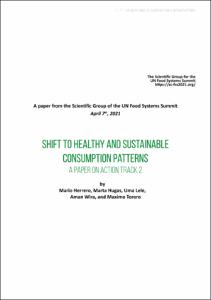Shift to Healthy and Sustainable Consumption PatternsA paper on Action Track 2

Shift to Healthy and Sustainable Consumption Patterns
A paper on Action Track 2

| dc.contributor.author | Herrero, Mario | |
| dc.contributor.author | Hugas, Marta | |
| dc.contributor.author | Lele, Uma | |
| dc.contributor.author | Wira, Aman | |
| dc.contributor.author | Torero, Maximo | |
| dc.date.accessioned | 2021-05-18T15:29:57Z | |
| dc.date.available | 2021-05-18T15:29:57Z | |
| dc.date.issued | 07.04.2021 | |
| dc.identifier.uri | https://hdl.handle.net/20.500.11811/9084 | |
| dc.description.abstract | Action Track 2 works to catalyse a shift in consumer behaviour that will create and build demand for sustainably produced agriand ocean food products, strengthen shorter value chains, promote circular use of food resources, helping to reduce waste and improve nutrition, especially among the most vulnerable. This Action Track recognises that current food consumption patterns, often characterised by higher levels of food waste and a transition in diets towards higher energy, more resource-intensive foods, need to be transformed. Food systems in both developed and developing countries are changing rapidly. Increasingly characterized by a high degree of vertical integration, evolutions in food systems are being driven by new technologies that are changing production processes, distribution systems, marketing strategies, and the food products that people eat. These changes offer the opportunity for system-wide change in the way in which production interacts with the environment, giving greater attention to the ecosystem services offered by the food sector. However, developments in food systems also pose new challenges and controversies. Food system changes have responded to shifts in consumer preferences towards larger shares of more animal-sourced and processed foods in diets, raising concerns regarding the calorific and nutritional content of many food items. By increasing food availability, lowering prices and increasing quality standards, they have also induced greater food waste at the consumer end. In addition, the risk of fast transmission of food-borne disease, antimicrobial resistance and food-related health risks throughout the food chain has increased, and the ecological footprint of the global food system continues to grow in terms of energy, resource use, and impact on climate change. The negative consequences of food systems from a nutritional, environmental and livelihood perspective are increasingly being recognized by consumers in some regions. With growing consumer awareness, driven by concerns about the environmental and health impacts of investments and current supply chain technologies and practices, and by a desire among new generations of city dwellers to reconnect with their rural heritage and to use their own behaviour to drive positive change, opportunities exist to define and establish added-value products that are capable of internalising social or environmental delivery within their price. These forces can be used to fundamentally reshape food systems by stimulating coordinated government action in changing the regulatory environment that in turn incentivises improved private sector investment decisions. Achieving healthy diets from sustainable food systems is complex and requires a multi-pronged approach. Actions necessary include awareness-raising, behaviour change interventions in food environments, food education, strengthened urban-rural linkages, improved product design, investments in food system innovations, public private partnerships, public procurement, and separate collection enabling alternative uses of food waste can all contribute to this transition. Local and national policymakers and small and large scale private sector actors have a key role in both responding to and shaping the market opportunities created by changing consumer demands. | en |
| dc.format.extent | 25 | |
| dc.language.iso | eng | |
| dc.rights | In Copyright | |
| dc.rights.uri | http://rightsstatements.org/vocab/InC/1.0/ | |
| dc.subject | Food security | |
| dc.subject | Sustainability | |
| dc.subject | Value chain | |
| dc.subject | Consumption | |
| dc.subject.ddc | 610 Medizin, Gesundheit | |
| dc.title | Shift to Healthy and Sustainable Consumption Patterns | |
| dc.title.alternative | A paper on Action Track 2 | |
| dc.type | Arbeitspapier | |
| dc.identifier.doi | https://doi.org/10.48565/scfss2021-9240 | |
| dc.publisher.name | Center for Development Research (ZEF) in cooperation with the Scientific Group for the UN Food System Summit 2021 | |
| dc.publisher.location | Bonn | |
| dc.rights.accessRights | openAccess | |
| dc.relation.url | https://sc-fss2021.org/wp-content/uploads/2021/04/Action_Track_2_paper_Shift_to_Healthy_Consumption.pdf | |
| ulbbn.pubtype | Zweitveröffentlichung | |
| dc.version | updatedVersion |
Dateien zu dieser Ressource
Das Dokument erscheint in:
-
Scientific Group Reports (8)
These papers are shared to provide information and facilitate discussion for transparent and evidence-based Summit preparations.




